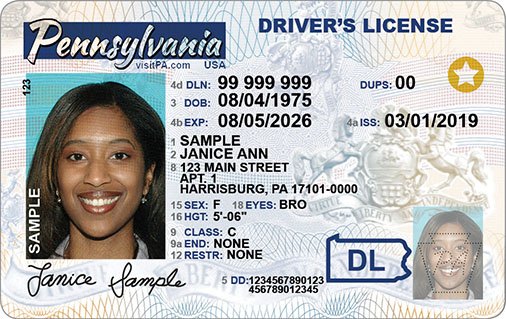National Real ID Deadline Delayed Until 2021

On Thursday, Homeland Security Secretary Chad Wolf announced that the Real ID deadline — which had previously been delayed indefinitely due to the coronavirus outbreak — has been pushed back until October 21st, 2021, as directed by President Trump.
Enacted in May of 2005, the Real ID Act was basically Congress over-responding to 9/11 by mandating that state-issued driver’s licenses be updated so they can be used for official purposes by the federal government (as defined by Homeland Security). While the primary goal is to mitigate air travel of undocumented immigrants between states, the aforementioned “official purposes” applies to whatever the federal government thinks prudent on any given day — including barring citizens without the ID from military bases or federal buildings, in addition to air travel.
If you haven’t heard of Real IDs (indicated by a little gold star in the corner), you’re not alone. The issue only gets a smattering of coverage every couple of years; plenty of states spent the period following 2005 pushing back against the plan, delaying its implementation several times via extensions. It was initially supposed to come into effect in four phases starting in 2008, but changes didn’t actually start until 2014. At this point, the nation is at phase three (which restricts access to federal facilities), with phase four applying new rules to U.S. air travel.
The Real ID arrangement is not terribly popular among public interest groups across the political spectrum. It’s opposed by the American Civil Liberties Union, People for the American Way (progressive), American Center for Law & Justice (conservative-Christian), American Federation of Labor and Congress of Industrial Organizations (liberal pro-union), Gun Owners of America (pro-gun, duh), the Cato Institute (libertarian), and countless groups advocating for digital privacy and public officials/legislators from both parties.
Many have criticized Real ID as unconstitutional and a blatant overreach by the federal government against states’ rights. Others are just angry the act passed behind closed doors with little to no input from the American public, or are concerned with the amount of personal information that could be floating around various national databases. There’s also some confusion as to how the system is even supposed to function — as it basically establishes a federal form of identification with real legal implications that’s left entirely to states for implementation.
Many states also already offer “enhanced drivers licenses” that use similar features but don’t technically qualify as Real IDs, requiring individuals to reapply. That requires quite a bit of documentation, including some previous form of identification, birth certificate, documentation of legal status (social security card), and showing name and principal residence address — all of which will be kept on file in each state’s DMV/SOS database to be shared with all other states.
However, with many federal buildings closed on account of the coronavirus, Trump has elected to extend the deadline until October 2021. That should buy people some time to get theirs (so they aren’t barred from flying) or perhaps rally for one big push against an act that doesn’t seem terribly welcome.
Post-9/11 security measures have already allowed the National Security Agency to spy on countless U.S. citizens who had done nothing wrong. Critics say Real ID poses similar concerns, with advocates claiming it’s simply an easy way to expand the usefulness of driving IDs to promote public safety by creating something that’s harder to counterfeit. Whichever description is more accurate, Homeland Security said there would be no changes beyond the delay on Thursday.
“Due to circumstances resulting from the COVID-19 pandemic and the national emergency declaration, the Department of Homeland Security, as directed by President Donald J. Trump, is extending the REAL ID enforcement deadline beyond the current October 1, 2020 deadline,” Acting Homeland Security Secretary Chad Wolf said in a statement. “I have determined that states require a twelve-month delay and that the new deadline for REAL ID enforcement is October 1, 2021. DHS will publish a notice of the new deadline in the Federal Register in the coming days.”
“The federal, state and local response to the spread of the Coronavirus here in the United States necessitates a delay in this deadline. Our state and local partners are working tirelessly with the Administration to flatten the curve and, therefore, we want to remove any impediments to response and recovery efforts. States across the country are temporarily closing or restricting access to DMVs. This action will preclude millions of people from applying for and receiving their REAL ID. Extending the deadline will also allow the Department to work with Congress to implement needed changes to expedite the issuance of REAL IDs once the current health crisis concludes.”
[Images: Alex Millauer/Shutterstock; Pennsylvania DMV]

A staunch consumer advocate tracking industry trends and regulation. Before joining TTAC, Matt spent a decade working for marketing and research firms based in NYC. Clients included several of the world’s largest automakers, global tire brands, and aftermarket part suppliers. Dissatisfied with the corporate world and resentful of having to wear suits everyday, he pivoted to writing about cars. Since then, that man has become an ardent supporter of the right-to-repair movement, been interviewed on the auto industry by national radio broadcasts, driven more rental cars than anyone ever should, participated in amateur rallying events, and received the requisite minimum training as sanctioned by the SCCA. Handy with a wrench, Matt grew up surrounded by Detroit auto workers and managed to get a pizza delivery job before he was legally eligible. He later found himself driving box trucks through Manhattan, guaranteeing future sympathy for actual truckers. He continues to conduct research pertaining to the automotive sector as an independent contractor and has since moved back to his native Michigan, closer to where the cars are born. A contrarian, Matt claims to prefer understeer — stating that front and all-wheel drive vehicles cater best to his driving style.
More by Matt Posky
Latest Car Reviews
Read moreLatest Product Reviews
Read moreRecent Comments
- Danddd Or just get a CX5 or 50 instead.
- Groza George My next car will be a PHEV truck if I can find one I like. I travel a lot for work and the only way I would get a full EV is if hotels and corporate housing all have charging stations.I would really like a Toyota Tacoma or Nissan Frontier PHEV
- Slavuta Motor Trend"Although the interior appears more upscale, sit in it a while and you notice the grainy plastics and conventional design. The doors sound tinny, the small strip of buttons in the center stack flexes, and the rear seats are on the firm side (but we dig the ability to recline). Most frustrating were the repeated Apple CarPlay glitches that seemed to slow down the apps running through it."
- Brandon I would vote for my 23 Escape ST-Line with the 2.0L turbo and a normal 8 speed transmission instead of CVT. 250 HP, I average 28 MPG and get much higher on trips and get a nice 13" sync4 touchscreen. It leaves these 2 in my dust literally
- JLGOLDEN When this and Hornet were revealed, I expected BOTH to quickly become best-sellers for their brands. They look great, and seem like interesting and fun alternatives in a crowded market. Alas, ambitious pricing is a bridge too far...



































Comments
Join the conversation
Nevada has been a 'gold star' licensing state at least for the last three years for new residents.
It is completely pointless. All this "real ID" BS started because of 9/11 Several hijackers had Real IDs, fraudulently obtained VA licenses. Once again the innocent get punished for the crimes of the guilty.....